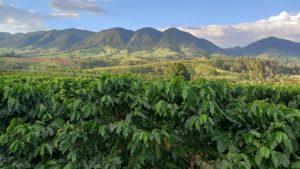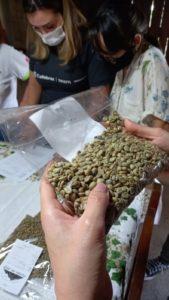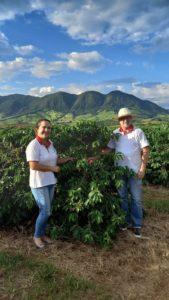(MENAFN- Brazil-Arab News Agency (ANBA))

Andradas – The states of Minas Gerais, Brazil's leading coffee producer, and São Paulo have stood out for a new terroir: the Volcanic Region . The area has its own traits that benefit the production of specialty coffees , the main one being the volcanic soil, which is known for its high fertility and enriches the history behind coffee and helps bringing together the family farming in twelve towns.
Encompassing these towns, the Coffee-Growers Association of the Volcanic Region was gestated for years before its official launch during Brazil's Coffee International Week 2021.“It's still a hidden treasure. When people find out all this richness, this will become a great strength in Brazilian coffee farming. So we must talk more as a region, you know?” said Ulisses Ferreira, the association's executive director.
Around the volcano

Supported by Andradas' Agriculture Secretariat, the farmers welcome coffee buyers and journalists
The so-called volcanic soil occurs because the municipalities are part of a volcanic chain. The phenomenon arise from the activities of a volcano that has been extinct for 80 million years and contributed to the formation of the vegetation predominantly of Atlantic Forest.
Another feature for the quality of the coffees, the altitude of the region was also influenced by the volcanic activity and resulted in crops ranging from 700 to 1,300 meters. The terrain influences the average annual temperature between 17 and 20 Celsius degrees and contributes to the fruits taking longer to developed, being harvested later in the year than in other places.

The Crochiquio de Carvalho family produces naturally processed specialty coffees
Inside the volcanic coffee territory, there're other associations and cooperatives. One of them is the Coffee-Growers Association of the Gabirobal District (ACAFEG) from the city of Andradas, Minas Gerais. The group is around for 15 years and has earned the Fair Trade certification in 2010. The fair trade energized the producers, mostly small farmers, and offers activities inside and outside the farms.“We use the headquarters to teach courses and hold other activities such as gymnastic and stretching classes for members,” said Aline Benezene Manzoli, administrative assistant at ACAFEG.

Father and daughter: The founder of ACAFEG relies on Aline to keep the association growing
Manzoli is the daughter of one of the founding farmers and started working in the association as a volunteer.“I'm not used to be on the spotlight, I'm usually backstage,” she said during the panel she participated in during the 1st Meeting of the Women of the Volcanic Region on March 8. Out of the spotlight, she organizes the group and empowers other women to actively work in ACAFEG.“This year we'll give many courses, including [coffee] tasting, which was a demand of women. When I took it, I was the only woman. But now they are the ones who asked for it. And we'll launch a roasted coffee brand soon,” she stressed.
The agricultural organization is supported by institutions like Minas Gerais state-backed agriculture advisory body Emater-MG.“We're always close when they begin [to create an association], and when it's all settled, people go ahead on their own, and we can focus on other projects. That's the role of rural extension,” points out Maria Neuza, a technician of Emater that accompanied the creation of ACAFEG and keeps supporting local production.

Coffee buyers received samples of the raw products to taste after a tour around the region.
Neuza points out that the town is focused on coffee production, and most producers are family farmers. Such is the case of one of the oldest members who has its coffee plantation close to the headquarters, Domingos Leone Neto , who ranked second in the 2020 Andradas Coffee Competition.“At first, many people said we were crazy, and that fair trade wouldn't work. Now my son has an Instagram profile of our coffee, and some buyers have reached out to him,” said the farmer who takes care of the Leone's Coffee farm together with his family.
A few minutes away, and some feet above, is located another farm that's a member of ACAFEG, Sítio São José. The altitude of Serra dos Limas, where the coffee plantation of José Carlos de Carvalho and his wife Odimar Crochiquio de Carvalho is located, is approximately 1,400 meter high.“This last harvest season, despite all climate issues, we managed to produce an excellent quality coffee. The lowest scoring one got 83 points,” Carvalho said. Professional tasters score the beverage according to the scale of the Specialty Coffee Association (SCA) from 0 to 100, and only the ones above 82 are considered specialty.

Juliana and her husband Paulo in the coffee farm they started only five years ago
Besides Fair Trade, the farm is certified by Certifica Minas , a state program that ensures good agricultural, environmental and labor practices. In addition to green coffee, the family has its own roasted coffee brand, Filhos de José . The name plays tribute to José Carlos' father and makes a link with the new generation of his daughters and sons-in-law Pâmela Maria de Carvalho Cazaroto, Fernando Henrique Cazaroto, Ana Carla Carvalho e Ramon de Lima, who also take care of the 9-alqueire farm and divide the work and harvests between three families.
Another member of the Volcanic Region is Juliana Lanzani Gomers . The farm in Andradas is on its fourth generation of Italian immigrants with women active in the business. While her grandfather focused on grape trees, her grandmother devoted herself to coffee growing. The farm now also plants bananas. But with the same passion of her ancestor, Gomes is focusing back on coffee.
The family sells the Café Empório Thereza , but also sells raw coffee to buyers from Brazil and elsewhere. For this, the farmer is supported by her husband Paulo Roberto, her daughters and exporter Daniel Lima, who handles international contracts.“We've sold to buyers from the United States, and we're negotiating with a buyer from the United Arab Emirates,” Gomes said.
*The journalist traveled at the invitation of the Volcanic Region.
Translated by Guilherme Miranda
Thais Sousa/ANBA
The post Volcanic soil brings families together in coffee region appeared first on Agência de Notícias Brasil-Árabe .
MENAFN16032022000213011057ID1103863092
Legal Disclaimer:
MENAFN provides the information “as is” without warranty of any kind. We do not accept any responsibility or liability for the accuracy, content, images, videos, licenses, completeness, legality, or reliability of the information contained in this article. If you have any complaints or copyright issues related to this article, kindly contact the provider above.